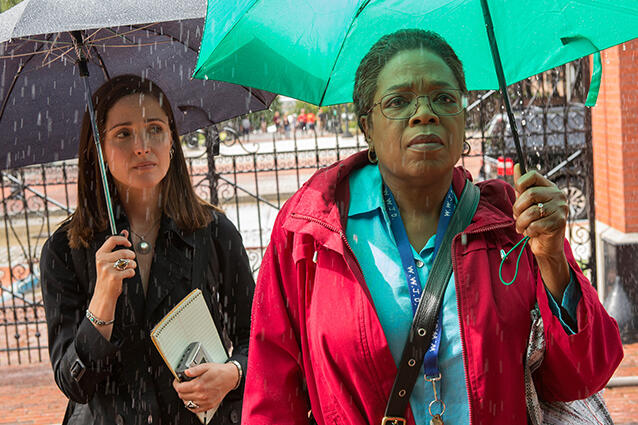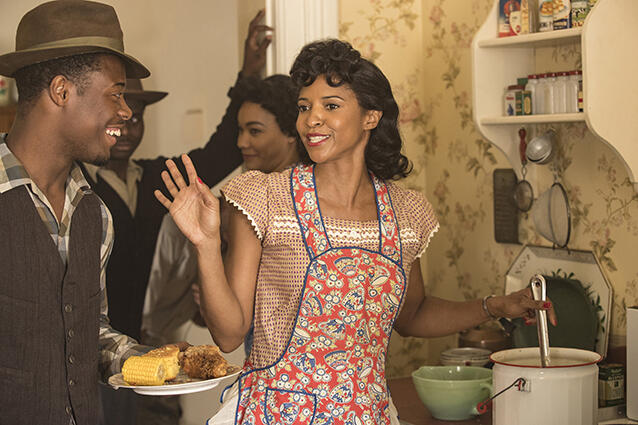
In 1951 at only 31 years old, Henrietta Lacks died from cervical cancer. Prior to her passing and without her knowledge, Johns Hopkins Hospital collected her cells, erased her name and titled them, HeLa. Those cells were immortal. They were the first to ever live and reproduce outside of the human body. Without her family’s consent, Henrietta’s cells were distributed all around the world and studied. They have been used to help create the HIV/AIDS cocktail, the polio vaccine, in-vitro fertilization and so much more. There is not a human being alive on the planet that has not been affected by Henrietta’s cells.
In 2010, reporter Rebecca Skloot published her book, “The Immortal Life of Henrietta Lacks” which HBO has adapted into a film starring Oprah Winfrey as Lacks’ youngest daughter, Deborah, Renée Elise Goldsberry as Henrietta and Rose Byrne as Rebecca Skloot. Directed by George C. Wolfe, “The Immortal Life of Henrietta Lacks” is the devastating story of a woman whose body was stolen from her and the family that she left behind who was exploited and betrayed as a result.
Earlier this week in a hotel in midtown, I sat with several other Black female journalists in a quaint room waiting for Oprah Winfrey and the cast to arrive. As the door opened, Ms. Winfrey looked at all of our faces and gasped in shock. She said, “Black girl magic! When has this ever happened? This is a story in itself!”
After the rest of the cast filtered in and we got settled, Ms. Winfrey, director George C. Wolfe and the rest of the cast began to discuss the life of a woman who gave us so much by sacrificing everything.

On Bringing This Story To Life
Oprah Winfrey: I worked in Baltimore as a young reporter from the time I was twenty-two to thirty. I lived in the city; I went to church every Sunday at Bethel A.M.E., and I’ve been to Hopkins many times. I am a student of the African American culture; I grew up reciting Langston Hughes and Countee Cullen and Margaret Walker and Sojourner Truth. I had never in all of my reading ever heard of HeLa or Henrietta Lacks. I could not believe that! How could I have been in this town all that time and never have seen one thing about her? I wanted as many people to know about this story as possible. So now you do.
On Henretta’s Life
George C. Wolfe: There are scenes in the movie where [Henrietta] is feeding her relatives and taking them in, and taking care of them. So when you speak about Jim Crow, it’s important to talk about the injustice of it; but it’s equally important to talk about how the community fortified itself. It’s like even if you’re not going to feed me, I’m going to feed myself and everybody else. So intrinsic even in [Henrietta’s] DNA was this incredible sense of responsibility and caring, feeling and nurturing. So when the cells come along, they continue to do the exact same thing. One of the things that I love is that on paper Henrietta Lacks is a marginally educated woman in the Jim Crow South. She has five children when she’s thirty-one. So on paper, you would go. “Oh, no power.” But anytime HeLa cells come into contact with other cells they take over. So to this day, it’s still astonishing to me how the biotech industry did not exist prior to HeLa.
Becoming Henrietta Lacks
Renée Elise Goldsberry: I feel like stepping into her body, stepping into her reality… we see this woman who knows something is wrong with her and she doesn’t live. That’s scary. There is nothing more frightening. There is this scene where she walks into Johns Hopkins Hospital in front of the largest white Jesus you’ll ever see. It doesn’t take a tremendous amount of acting prowess to imagine how small that would make you feel. I love the bravery in how she does that. I love the bravery with which she moves through the biggest nightmare one could imagine. That informs me of the bravery my grandmother must have had. That’s what inspires me. That’s what I want all of us to take from this, to embrace the idea that these women are powerful. Not victims. They are powerful.
https://www.instagram.com/p/BTCOgtLAeBP/
On the Hospital’s Crimes
George C. Wolfe: When somebody told you something in a white coat, it was law, it was gospel. So, the fact that this was buried for so long it’s astonishing, but it made sense as well because you didn’t question what a doctor said. That was also a very important part of this storytelling. Because Henrietta Lacks died of cervical cancer, which means it happened “down there,” the family wasn’t going to have a conversation about what happened. So it was secrets. But withholding information from someone is a sin. The fact that Johns Hopkins kept information from the family is a sin. The fact that people within the family kept information away from [Deborah] is a sin.
On The Complex Notions Of The White Savior
Rose Byrne: What’s unique about this story is that it’s from the perspective of a young white girl who is very naïve. She’s got no experience with African-American culture, admittedly. And then [she’s learning] from an older African-American woman, on this very unusual experience they have together, so [trying not to depict her as] the “white savior” was something we discussed from day one. It’s complicated and complex, and it’s something that I really leaned on George and Oprah for so I could try to understand, to navigate — to put it delicately.
George C. Wolfe: There is something that happens when Rebecca meets Deborah Lacks. Despite all of the things that have happened to Deborah, she does not view herself as a victim, nor is she without power nor is she without agency. What she doesn’t have is access. At one point she even says in the film, “So you keep on being white.” So I think they went on a journey together. And, one of the things that I felt was very interesting is that Deborah is testing [Rebecca]. So, to me, it’s a much more mercurial, complicated and on some level dangerous relationship.
Courtney B. Vance: It really speaks to how much we need each other. Instead of a going, “Why did a white person have to tell this story?” When we’re children we all play together, children don’t segregate and separate themselves until they learn. It’s a learned behavior.
On Playing Deborah Lacks
Oprah Winfrey: Deborah is taking this journey in the first place because she really wants to know about her mother. When you want to know about your mother or your grandmother, you want to know about yourself. So the journey for her is to discover herself. It becomes her balm, her solace, her comfort. I think in the end that’s what gave her a sense of peace. So it did become a friendship of sorts as much as a Black woman isolated from white people, disregarded and disrespected by white people, it was as close as she could come to having a friendship with Rebecca.
“The Immortal Life Of Henrietta Lacks” airs Saturday, April 22 on HBO at 8 PM ET.
You can watch this chat for yourself on Oprah’s Facebook Page.
Aramide A Tinubu has her Master’s in Film Studies from Columbia University. She wrote her thesis on Black Girlhood and Parental Loss in Contemporary Black American Cinema. She’s a cinephile, bookworm, blogger, and NYU + Columbia University alum. You can read her blog at: www.chocolategirlinthecity.com or tweet her @midnightrami
